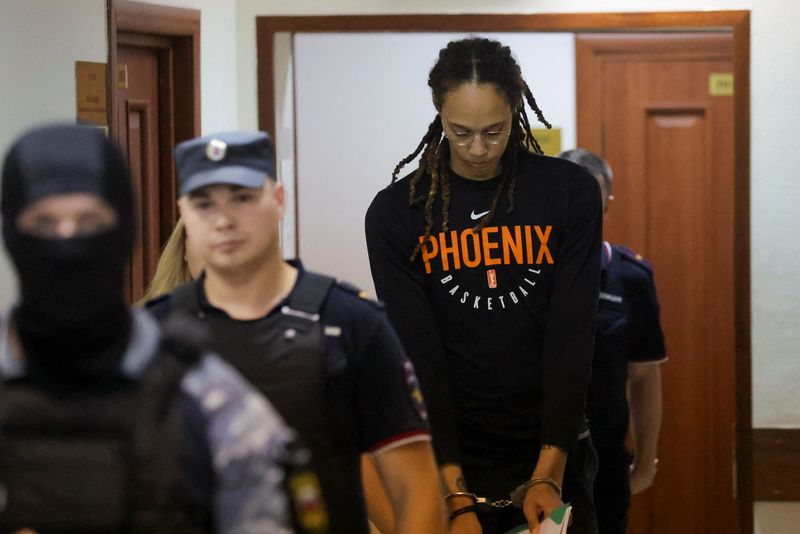U.S. basketball star Griner: My rights were not read upon arrest in Russia
2022.07.27 17:14
3/3

U.S. basketball player Brittney Griner, who was detained at Moscow’s Sheremetyevo airport and later charged with illegal possession of cannabis, is escorted before a court hearing in Khimki outside Moscow, Russia July 27, 2022. REUTERS/Evgenia Novozhenina
2/3
KHIMKI, Russia (Reuters) -U.S. basketball player Brittney Griner told a court on Wednesday she was not read her rights when detained at a Moscow airport in February, as she stands trial for drug charges that could see her face up to 10 years in prison.
The 31-year-old, a Women’s National Basketball Association (WNBA) star who has played in Russia during the league’s offseason, was detained at Moscow’s Sheremetyevo airport on Feb. 17 with vape cartridges containing hashish oil in her luggage.
Wearing a long-sleeved T-shirt from her WNBA team, the Phoenix Mercury, Griner testified that she was stopped at customs as she was about to board a flight to Ekaterinburg, a city 1,400 km (870 miles) east of the Russian capital.
Griner, a two-time Olympic champion, was on her way to join her Russian team, UMMC Ekaterinburg, for the playoffs.
Griner said officers removed vape cartridges from her luggage, and opened and sniffed their contents. She said she was asked to sign documents and used Google (NASDAQ:GOOGL) Translate to understand them.
“My rights were not read to me,” Griner said at Khimki District Court outside Moscow, according to a translator.
“I took my phone out, called family, my agent and a translator who works with the team.”
Seated in the defendant’s cage, Griner said she was provided with a translator at the airport but he only said “sign this, sign that” without explaining the content of the documents.
Griner pled guilty earlier in the trial but denied she intended to break Russian law.
She said on Wednesday that she still did not understand how the vape cartridges could have ended up in her luggage, saying she had packed hurriedly and could accidentally have included them.
Griner said she had been prescribed medical cannabis in the United States to treat chronic injuries in the off-season, a treatment not uncommon among elite athletes in countries where the substance is allowed. It is, however, illegal in Russia.
The case against her has highlighted strained relations between Russia and the United States that have plunged to a new post-Cold War low over the Russian military intervention in Ukraine.
U.S. officials and prominent athletes say Griner has been wrongly detained and have called for her immediate release, saying she is being used as a political pawn to secure the release of a Russian detained in the United States or other concessions from Washington.
The Kremlin has said the case against Griner has nothing to do with politics and that she should be tried for violating Russian laws.








